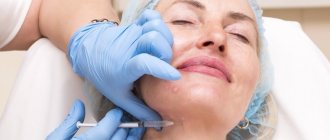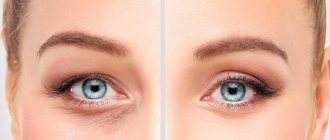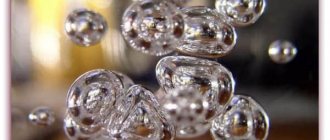Content
- What is hyaluronic acid?
- The use of hyaluronic acid in gynecology
- Effects of using hyaluronic acid
- Contraindications to the procedure
The world does not stand still, everything flows, everything changes. It would seem that those techniques that have been used for a long time in cosmetology have become absolutely acceptable in gynecology. Hyaluronic acid – what is it, where can it be used in gynecology, what effects can we expect from it? In this short article, we will try to understand these issues.
Hyaluronic acid. About the pros, cons and application
Articles
Hyaluronic acid, also known as hyaluronan, is a clear, sticky substance that is produced by your body. The largest amount of it is found in the skin, connective tissue and eyes. The key function of hyaluronan is to retain water to keep your tissues well lubricated and hydrated.
Basic information about hyaluronic acid
Ingredient Type: Hydrator.
Main benefits: moisturizes the skin, reduces the appearance of wrinkles, replenishes cellular moisture, accelerates wound healing.
Safety: In general, hyaluronic acid is safe for all skin types, but is especially beneficial for those with dry skin. However, people with eczema should make sure that it does not irritate the skin.
When you can use it: Hyaluronic acid can be applied on, injected, or taken orally. Additionally, it is included in many dietary supplements and dietary supplements.
Works well with vitamin C, vitamin B5 and glycolic acid.
Hyaluronic acid is a molecule that is found naturally in your skin as well as connective tissue in the body. It is a natural polysaccharide found in the human body that acts as a shock absorber and lubricant for our joints, nerves, hair, skin and eyes.
Skin contains about half of the body's hyaluronic acid. It binds to water molecules, which helps keep the skin hydrated and elastic. Its level in the skin decreases significantly with age, which can lead to dehydration and the appearance of wrinkles. Supplementing with hyaluronic acid or using cosmetics containing it can improve skin hydration and reduce signs of aging.
Why is hyaluronic acid so popular?
The moisture-retaining properties of hyaluronic acid have led people to use it primarily for joint health and skin care. For joint health, it helps preserve synovial fluid. It is a fluid found in many of our joints that helps lubricate them and keep them moving effortlessly, without squeaking.
The acid also helps protect the skin and indirectly supports other aspects of health (tone, elasticity, etc.). Throughout the aging process, our skin loses moisture. It is often said that by age 50 we have about a quarter of the hyaluronic acid in our skin. Both joints and skin are problems that come with age.
Have questions about medications? Call and our consultants will answer! 8 (toll free)
Proven benefits of hyaluronic acid
- Promotes healthier, more elastic skin.
The reason the beauty industry loves it so much is because of its magical ability to lock in moisture. Research has proven that hyaluronic acid binds surprisingly well to water molecules to retain moisture in the skin. Lack of moisture is one of the main culprits of skin aging, which is why this ingredient is a must when it comes to restoring your skin's hydration.
Retains Moisture: Hyaluronic acid helps replenish and retain cellular moisture, resulting in hydrated, youthful, fresh skin.
Reduces the appearance of wrinkles: Since dehydrated skin is one of the main causes of wrinkling, hyaluronic acid replenishes lost moisture and helps reduce the appearance of any fine lines.
Safe option: Since the composition of hyaluronic acid is closely related to substances in our body, it works well and does not cause severe irritation.
Absorbs Fast: Unlike some skin care products, hyaluronic acid absorbs easily and gently. Its double effect is achieved if you take hyaluronic acid orally.
Non-irritating: safe for use by all skin types.
- May speed up wound healing
Hyaluronic acid also plays a key role in wound healing. It is naturally present in the skin, but its concentration increases when there is damage. Hyaluronic acid helps wounds heal faster by regulating inflammation and signaling the body to rebuild more blood vessels in the damaged area.
It also has antibacterial properties, so it may help reduce the risk of infection when applied directly to open wounds and taken orally.
- Relieves joint pain by keeping bones well lubricated.
This beneficial substance is also found in joints, where it lubricates the space between bones. When joints are lubricated, bones are less likely to rub against each other and cause unpleasant pain. Hyaluronic acid supplements are very beneficial for people suffering from osteoarthritis, a type of degenerative joint disease caused by wear and tear on the joints over time.
- Soothe stomach discomfort
New research suggests that hyaluronic acid supplements may help reduce symptoms of stomach and intestinal discomfort. It soothes the damaged mucous membrane of the esophagus and speeds up the recovery process.
- Relieve dry eyes
Approximately 1 in 7 working people suffer from dry eye symptoms due to constant computer use. Because hyaluronic acid is excellent at retaining moisture, it is often used to treat dryness. Hyaluronic acid supplements have been proven to reduce dry eye symptoms and improve eye health.
- Maintain bone strength
Two studies have shown that hyaluronic acid supplements may help slow the rate of bone loss and prevent osteoprosis.
Buy Collagen with Hyaluronic Acid on our website:
Inject or take orally?
Traditionally, hyaluronic acid has been used as an injectable to promote joint health and maintain joint structure. But these days, more and more dietary supplements with hyaluron are appearing, which can be taken orally and get a stable effect.
Research shows that oral hyaluronic acid is well absorbed and functions in at least three important ways:
1) part is absorbed intact;
2) some of it is broken down into its constituent sugars and absorbed that way (providing building blocks that the body can use to repair itself);
3) Hyaluronic acid acts to stimulate the growth of beneficial bacteria in the digestive tract, which helps strengthen the immune system and leads to overall healthy joints, skin and connective tissue throughout the body.
These three unique and distinct mechanisms of action illustrate the ability of oral hyaluronic acid to benefit and support the body's connective tissue. It has also been shown to act as a prebiotic as it increases the levels of lactobacilli and bifidobacteria in the intestinal tract.
Write to us on WhatsApp for any questions!
Possible side effects and precautions
Hyaluronic acid is generally safe to use. Since the body produces it naturally, allergic reactions are very rare. However, its effects during pregnancy or breastfeeding have not been thoroughly studied, so these groups should be careful when using dietary supplements with hyaluronic acid.
Where can and should hyaluronic acid be used in gynecology?
- Vaginal dryness, decreased elasticity of vaginal tissue.
- Discomfortable sensations in the vagina.
- Chronic irritation, itching.
- Chronic inflammatory processes in the vagina due to gaping of the genital slit.
- Decreased muscle tone and elasticity of the vaginal mucosa, which leads to decreased sexual activity, pain during intercourse, and difficulty achieving orgasm.
- Scars of the perineum and vagina in the postpartum period.
- Mild to moderate urinary incontinence syndrome, chronic cystitis.
- Loss of volume of the labia majora, their sagging, deformation, smoothing of the labia and clitoris.
What effects can you expect from using hyaluronic acid?
The answer lies in the application point question. Where can it be applied? Effects:
- Hydration - moisturizing: we solve the problem of vaginal dryness, decreased vaginal elasticity, irritation and itching.
- Volume – we solve the problem of genital gaping, increase muscle tone, increase the elasticity of the mucous membrane, solve the problem of urinary incontinence, chronic cystitis.
- Treatment of sexual dysfunction as a consequence of solving the above issues.
- The effect lasts from 12 to 18 months.
Treatment of joints with hyaluronic acid
Since hyaluronate is produced directly in articular cartilage, its deficiency affects joint mobility. Worn out cartilage cannot function fully and osteoarthritis develops.
The use of hyaluronic acid for the treatment of joint pathologies is usually prescribed when other medications have failed. Hyaluronate is first prescribed in capsules or tablets, 100–200 mg per day. In the initial stages of osteoarthritis, taking tablets orally gives a good effect. In later stages, oral forms are less effective and injections are the option.
Hyaluron is injected directly into the joint space under X-ray control. The medicine for injection into the joint comes in the form of a gel-like liquid and can be administered in different ways:
- Injection once a week for 4 – 8 weeks in one joint. Short-acting solutions are used for this purpose. This method is good because the hyaluronic acid enters the joint gradually, constantly being renewed.
- 2 injections with an interval of 10 days. For the first injection, a medicine with an anti-inflammatory component is used, after 10 days a concentrated drug of prolonged action is administered. The therapeutic effect with this method of treatment reaches from 6 months to a year.
When diagnosing osteoarthritis, pay attention to hyaluronate tablets; if treatment is started in a timely manner, injections will not be needed. Our range can be viewed here -.
Contraindicated in the presence of:
- genitourinary infection,
- changes in the mucous membrane,
- conditions after radiation therapy,
- mixed or urgent urinary incontinence. Urge urinary incontinence is a pathological condition when the patient often experiences a sudden urge to urinate, which she is unable to tolerate, and when, against the background of this intolerable urge to urinate, there is uncontrollable leakage of urine.
Sincerely, Laura Konstantinovna Olshanskaya , gynecologist
Make an appointment Return to list of publications
Important questions about using skincare products with hyaluronic acid
Is hyaluronic acid safe and at what age is it suitable for use?
Hyaluronic acid is considered the safest and most neutral substance, so you can use cosmetics with this component starting from adolescence. However, in fact, teenagers are unlikely to need such products, because their skin itself is sufficiently moisturized. Cosmetologists recommend cosmetics with hyaluronic acid to women who notice the first signs of aging on their face, as well as to people with dry skin.
What types of hyaluronic acid are there and which is healthier?
Hyaluronic acid can be low- and high-molecular. It was previously believed that there was no benefit from high molecular weight because it did not pass through skin cells, but studies have shown this statement to be false. That is why it is best when both options are used in the serum. Low-molecular hyaluronic acid is able to penetrate into the deep layers of the epidermis, while high-molecular hyaluronic acid protects the skin, creating an external “shield” on its surface.
How to properly use hyaluronic acid on the face?
You also need to apply hyaluronic acid serum in the correct way, otherwise you risk severely dehydrating your skin. To swell and do its job, the hyaluronic acid molecule needs water. And it is very important where she takes it from - from the surface of your face, from the air or... from deep in the skin. It is the latter option that causes problems. However, this is easy to avoid: simply apply the serum to damp skin, and then quickly “seal” with cream.










